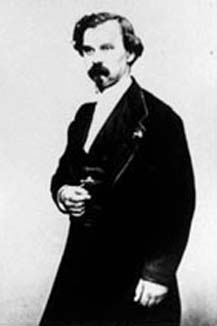Jules Antoine Lissajous
| Jules Antoine Lissajous | |
|---|---|

Jules Antoine Lissajous, date and photographer unknown
|
|
| Born |
March 4, 1822 Versailles, France |
| Died | June 24, 1880 (aged 58) Plombières-les-Bains, France |
| Residence | France |
| Fields | Mathematics |
| Known for | Lissajous figures |
Jules Antoine Lissajous (French pronunciation: [ʒyl ɑ̃twan lisaʒu]) (March 4, 1822 in Versailles – June 24, 1880 in Plombières-les-Bains) was a French physicist, after whom Lissajous figures are named. Among other innovations, Lissajous invented the Lissajous apparatus, a device that creates the figures that bear his name. In it, a beam of light is bounced off a mirror attached to a vibrating tuning fork, and then reflected off a second mirror attached to a perpendicularly oriented vibrating tuning fork (usually of a different pitch, creating a specific harmonic interval), onto a wall, resulting in a Lissajous figure. This led to the invention of other apparatus such as the harmonograph.
...
Wikipedia
